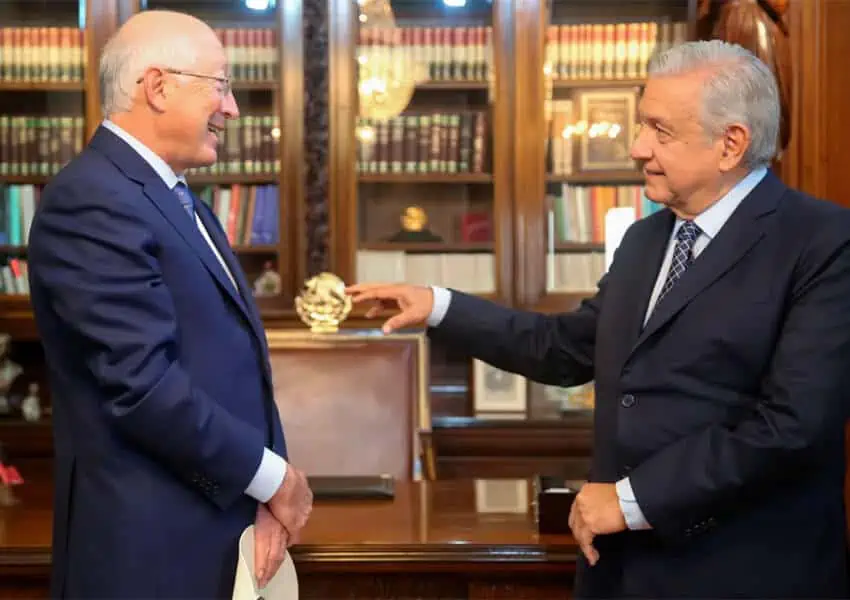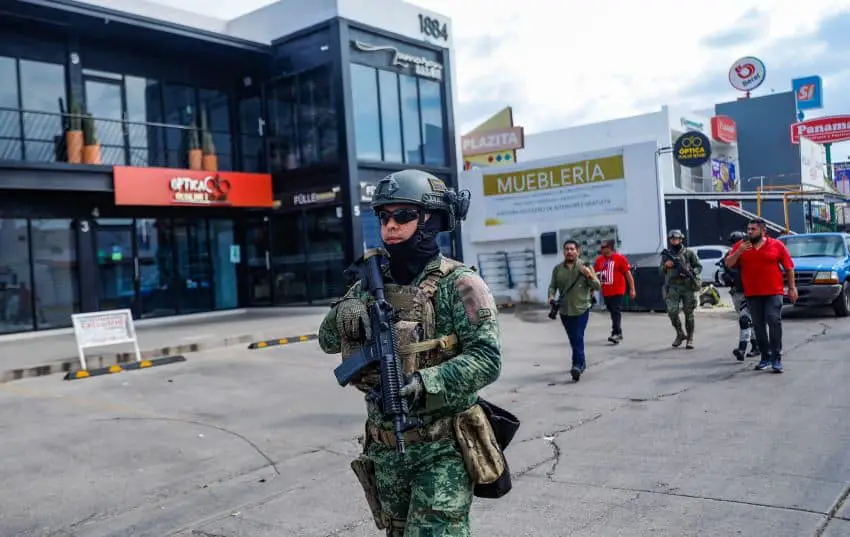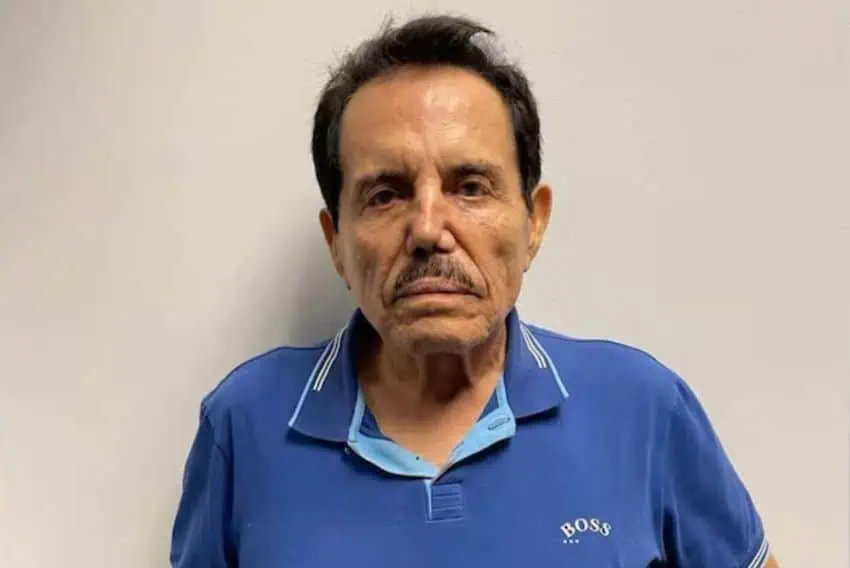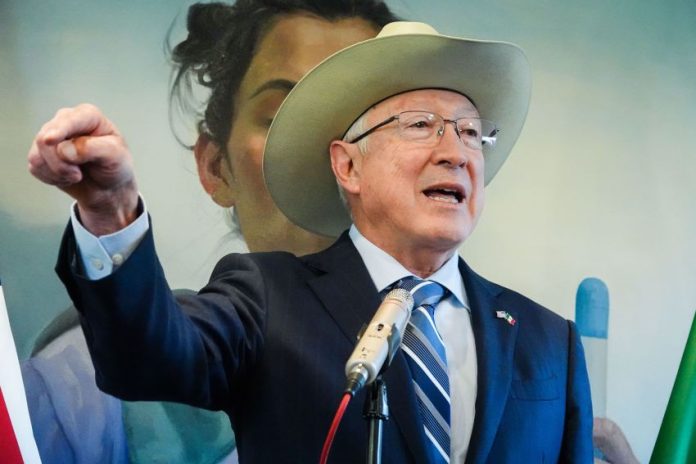United States Ambassador to Mexico Ken Salazar lashed out at the previous federal government on Wednesday, declaring that its “hugs, not bullets” security strategy failed and blaming former president Andrés Manuel López Obrador for a breakdown in bilateral security cooperation.
His remarks — perhaps the most pointed of his tenure to date as ambassador — prompted the Ministry of Foreign Affairs (SRE) to send a diplomatic note to the United States Embassy in Mexico.
“In the note, Mexico expresses its concern over the statements made by the U.S. ambassador to our country,” the SRE said in a statement.
In a press conference at his official residence in Mexico City, Salazar also took aim at what he characterized as a Mexican government narrative that there is no major security problem in Mexico.
“To say there isn’t a problem is to deny the reality,” he said.
“The reality is there is a very big problem in Mexico and that’s why the [security] plan of President [Claudia] Sheinbaum has to be successful,” Salazar said.

The ambassador, a frequent visitor to the National Palace while López Obrador was president, bluntly declared that the “hugs, not bullets” (abrazos, no balazos) security strategy implemented by the previous government “didn’t work.”
The United States supports the prevention part of the strategy — the attention to the root causes of crime through social programs — but Mexico also needs to apply the law to ensure there is no impunity for criminals, Salazar said.
“Security is the most important thing, the hinge of a democracy,” he said. “The people of Mexico mustn’t live with fear.”
Salazar charged that security coordination between the United States and Mexico “unfortunately … failed in the past year, in large part because the previous president didn’t want to receive support from the United States.”
“He closed the door on [security] investment of more than US $32 million because he didn’t want this investment to arrive in Mexico to help the Mexican people,” he said.
Support from the U.S. government was “rejected because of ideological problems or other explanations” not based on the reality of the security situation Mexico faces, Salazar said.
To emphasize what he sees as the gravity of Mexico’s insecurity problem, the ambassador referred to the ongoing violence in Sinaloa, where infighting between rival factions of the Sinaloa Cartel has claimed scores of lives in recent months.
He also said that “the reality is that the people of Mexico … don’t live in safety.”

Business people, “members of the press like you, those who work on street corners” and “those who have ranches” all face security risks, Salazar said.
“Like the cattleman in Sinaloa who was killed on the weekend because he was a leader,” he said.
Among the other incidences of violence Salazar referred to was the murder of a priest in Chiapas last month and the killings of two elderly Jesuit priests in Chihuahua in 2022.
He also hit back at López Obrador’s assertion in September that that the United States government was partly to blame for the wave of cartel violence in Sinaloa.
“Blaming others, blaming the United States, … that’s not what is needed to reach security,” Salazar said.
His forthright assessment of Mexico’s security situation and declaration that the “hugs, not bullets” security strategy failed will likely be among his final public remarks as ambassador as he won’t remain in the position once Donald Trump returns to the White House in January.
Salazar, a former United States senator and secretary of the interior during the Obama administration, was nominated by U.S. President Joe Biden in 2021, and arrived in Mexico City in September of that year.
His close relationship with López Obrador soured earlier this year after he made critical remarks about the government’s judicial reform and due to what the Mexican government regarded as a lack of transparency about the arrests of alleged Sinaloa Cartel drug traffickers Ismael “El Mayo” Zambada and Joaquín Guzmán López at an airport near El Paso, Texas, in late July.
López Obrador announced in late August that the Mexican government’s relationship with the United States Embassy in Mexico was “on pause.”

“How are we going to allow [Salazar] to opine that what we’re doing is wrong,” AMLO said at the time.
On Wednesday, the ambassador said the Sheinbaum administration needs to work on strengthening the security relationship between Mexico and the United States as it goes about implementing its security strategy.
That strategy, outlined by Security Minister Omar García Harfuch last month, continues to focus on combating the root causes of crime through social programs, but may allow for greater use of force against criminals, at least if recent weeks are an indication of what’s to come.
Salazar also stressed the need for “corrupt people” to be weeded out from state governments as well as the importance of creating “a strong justice system” that includes effective police forces made up of well-paid officers.
“You can’t pay a police officer almost nothing and expect that he’s going to do his work,” he said.
“… Police turn to corruption because they’re not paid enough to live on,” Salazar said.
The Sheinbaum administration, he added, “has to invest resources in … security.”
“… Republican austerity, as they say, won’t work to achieve security for the people of Mexico. They have to invest,” Salazar said.
The ambassador briefly addressed the victory of Trump and the Republican Party in the United States elections last week, saying that the loss for the Democratic Party “should hurt.”
With regard to Trump’s threats to impose tariffs on Mexican exports and deport millions of undocumented migrants, Salazar simply said that “a lot of what is said” while politicians are campaigning doesn’t eventuate.
He didn’t say when his term as ambassador will conclude, and it could be some time before Trump appoints a replacement, but it’s safe to say that Salazar is on his way out — and he evidently isn’t afraid to speak his mind as he departs.
With reports from Reforma, El Financiero and El País
